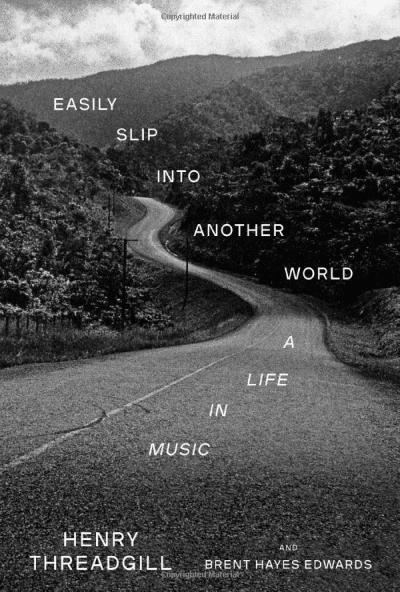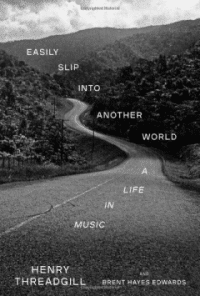.
.

Easily Slip Into Another World: A Life in Music
by Henry Threadgill and Brent Hayes Edwards
.
.
___
.
.
…..A short of list of great jazz autobiographies would include those by Louis Armstrong, Miles Davis, Hampton Hawes, Art Pepper, and Sidney Bechet. There are, of course, others.
…..Add this one to the list:
…..Easily Slip Into Another World: A Life in Music, by Henry Threadgill and Brent Hayes Edwards.
…..Threadgill is the celebrated composer, saxophonist and flautist who has been making music since the 1960’s in the various groups he’s led; among them Air, Very Very Circus, the Henry Threadgill Sextett, and Zooid. It was Threadgill’s 2016 recording with Zooid, In For a Penny, In For a Pound for which he was awarded the Pulitzer Prize, one of only three jazz artists ever to do so (Wynton Marsalis and Ornette Coleman being the others).
…..In a recent review in the New York Times, the critic Dwight Garner writes that Easily Slip Into Another World “is so good a music memoir, in the serious and obstinate manner of those by Miles Davis and Gil Scott-Heron, that it belongs on a high shelf alongside them.”
…..The book takes readers on Threadgill’s incredible life journey; his childhood in Chicago, startling Vietnam war experiences (and their after-effects), interactions with the Chicago music scene of the mid-60’s (the time of the influential Association for the Advancement of Creative Musicians which spawned artists and bands like the Art Ensemble of Chicago), his work in New York during the 70’s loft scene, and his extraordinary travel experiences.
…..I will soon publish an interview with Brent Hayes Edwards about this book…Meanwhile, this excerpt from the book tells the story of Threadgill’s backstage encounter with Duke Ellington in July, 1971.
.
Joe Maita
Editor/Publisher
.
.
___
.
.
Excerpted from Easily Slip into Another World: A Life in Music, by Henry Threadgill and Brent Hayes Edwards (Knopf, 2023)
.
…..Toward the end of July 1971, I go to see Duke Ellington with his orchestra. This is at the High Chaparral, the big ballroom where I perform with the Dells, near 77th Street and Stony Island on the South Shore. There are hundreds of people in the crowd, and it’s a lavish affair. I know my way around the place, so I slip backstage during the intermission. I’m hoping to be able to say something to him—just to introduce myself and tell him how much I appreciate his music. But I go back there and there are all these people swarming around him, all these men in tuxedos and high-society women in gowns with diamond brooches.
…..Ellington is holding court as only he can, talking to two or three fans at the same time. “Oh, yes, my dear, it’s been so long—when was the last time, in Paris? . . . And how is Horace doing these days? Is he still thriving in Antibes? . . . You enjoyed The Goutelas Suite? Yes, Mr. Gonsalves is indeed in fine form this evening. I’m so deeply honored that you appreciated our efforts. . . .”
…..I stand there for a minute watching him work the crowd. I can’t get within ten feet of him. Oh, well, I think. I get it. He’s surrounded by money. It’s obvious that I’m not supposed to be in the middle of this scrum.
…..All these refined people in their fancy clothes are brazenly shoving each other as they try to get in a word with the great man. The crowd ebbs and flows and then the current shifts and I find myself propelled a little closer to him.
….. I don’t even realize that he’s noticed me. But all of a sudden he reaches out and grabs me and pulls me next to him. He’s got his arm tightly around my waist, like he’s about to pull me onto the dance floor for a waltz. I think, What the hell is this? But he’s got me, and he’s still talking to all of these people, he doesn’t actually miss a beat in the multiple simultaneous conversations he’s having. He doesn’t look at me, he just keeps chatting in that debonair way he has. “Ah, yes, the weather in Newport was lovely, we just played there two weeks ago . . .”
…..Finally he looks over at me, still clutching me close by the waist. I lean back away from him, stunned by his attention and a little petrified at the same time.
…..“So,” he says, “what do we do?”
…..Just like that. I gape at him, astonished by his deployment of the royal “we.” I have no idea how to introduce myself. Ellington looks back away and continues a conversation with someone else in the crowd.
…..The only thing I know immediately is that I’m not going to tell him I’m a composer. I’m certainly not going to say that. So when he turns back to me, I say, “Um, I play woodwinds.”
…..My answer only serves to annoy him. “I know that,” he says. I think to myself, How could you possibly know that I play saxophone?
…..He looks me in the eye. “And what else?” And then he looks away again, still talking to people around us, still holding me close.
…..After a few more exchanges he turns back to me. He’s waiting for an answer and I’m in his clutches. So I confess, “Well, I write music sometimes.”
…..“Oh!” Ellington exclaims with mock surprise, hugging me tighter. “We write music sometimes, do we?”
…..I don’t know what to say now.
…..He’s got me and he’s talking, and he’s moving and dragging me with him, and the crowd is pressing in around us. Somehow he maneuvers us toward his dressing-room door. He’s still smooth-talking the aristocrats. Then in a single motion he enters the dressing room and pulls me inside with him. The door closes and we’re alone.
…..Duke always has a piano in his dressing room when he’s on the road. As we spin in through the door, he’s pulling me backward into the room, and before I even realize what’s happening he turns me around and sits me down at the piano. Finally he releases his grip on my waist and takes a step back to sit down on a couch behind me. Ellington leisurely pulls out a cigarillo and lights it and looks hard at me.
…..“So. Let’s hear some of our music, shall we?”
…..I’m sitting there looking over my shoulder at him, wondering how he flipped me down in front of the piano.
…..I’m so starstruck that I couldn’t play a C-major scale to save my life. I’m paralyzed. It does occur to me to play him something I’d been working on recently, a piece called “Melin,” after my son. But I can’t even lift my hands up to the keyboard.
…..Duke cracks up. But I can tell he’s not making fun of me. He gets it. He can see that I’m nervous because of who he is. He stands up from the couch and puts his hand on my shoulder. “I know,” he says, smiling. “I understand. You can stay, right?”
…..Of course I’m planning to stay for the second half of the show.
…..“Yeah, I’m staying.”
…..“Let’s go back out,” he says. “It’s time.”
…..He takes me out and gets me a spot where I can watch the band from the wings. And when he gets ready to hit, he looks over to see if I’m still there. I’m standing right to the side of Harry Carney—I place myself there deliberately to try to get a look at what he’s doing on the baritone. Ellington looks over at me with a twinkle in his eye and then he counts off the band and they start up.
…..“We write music sometimes, do we?” I’m standing there, listening to them launch into the Togo Brava Suite, and it occurs to me that maybe it isn’t such a bad thing that I froze. Maybe it’s lucky I was starstruck. Look what happened to Billy Strayhorn: he was a beast, a genius, he was beyond category, and he got swept up into Ellington’s world. What if Duke had made me an offer to work with him as an arranger? I have a feeling that if he had heard the music I was working on at that time, he might well have asked me. And I wouldn’t have been able to say no.
…..I’m glad that didn’t happen, I tell myself—I’m glad I didn’t even have to run that risk. I love him madly, but I can’t go work for Duke Ellington. I want to lead my own band and play my own music. I need to work for me.
.
.
___
.
.
Excerpted from Easily Slip into Another World: A Life in Music, by Henry Threadgill and Brent Hayes Edwards (Knopf, 2023)
.
.
Henry Threadgill was born in Chicago in 1944. In 2016, he was awarded the Pulitzer Prize for In For a Penny, In for a Pound, an album he composed for his sextet, Zooid. He lives in New York.
Click here to visit his Wikipedia page
.
Brent Hayes Edwards is a Professor at the Center for Jazz Studies at Columbia University and the Director of the Scholars-in-Residence Program at the Schomburg Center for Research in Black Culture at the New York Public Library.
.
.
Listen to “Beneath the Bottom,” a 2021 recording from Henry Threadgill’s album Poof; with Threadgill (alto sax, flute, bass flute); Liberty Ellman (acoustic guitar); Jose Davila (tuba, trombone.); Christopher Hoffman (cello); and Elliott Humberto (drums). [Pi Recordings]
.
.
___
.
.
Click here to read other book excerpts
Click here to subscribe to the Jerry Jazz Musician quarterly newsletter
.
*Text from the publisher
.
.
___
.
Jerry Jazz Musician…human produced (and AI-free) since 1999
.
.
.


































